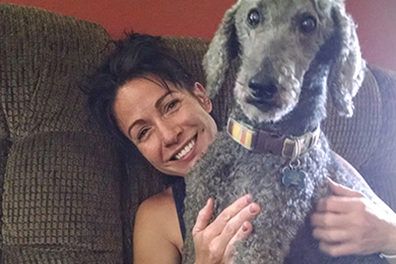Julie Noyes’ Three Minute Thesis
Clinical Skills Training in Simulated Operating Rooms
One of the greatest challenges in veterinary education is adequately preparing students for high-risk procedures such as surgery and anesthesia. Purpose-bred animals (specifically bred to live in cages and be subjected to repeated anesthetic episodes for unnecessary, invasive procedures) were traditionally used for this type of training, however this practice is being phased out of veterinary curricula due to financial, logistical, and ethical reasons. This creates a gap in veterinary education because it is difficult to develop effective clinical teaching strategies. In response to this need, I have designed simulated operating room environments for students to develop clinical skills while responding to a variety of programmed emergent scenarios. To evaluate the efficacy of simulation training I performed a meta-analysis that demonstrates simulation training is more effective than traditional training. I have conducted a series of empirical studies that report a 3 -fold increase in knowledge and self-efficacy for students trained with simulation. The students also had superior clinical skills and have become leaders among their classmates. My dissertation is built upon this research foundation and I aim to design additional simulation programs that fill the aforementioned gap in veterinary education and render the use of purpose-bred, terminal surgeries as obsolete.
Julie Noyes attended veterinary school at Colorado State University. After graduating in 2011, she joined Blue Sky Animal Clinic in Loveland, CO where she practiced mixed animal medicine. Next, she entered a small animal surgical internship at Aspen Meadow Veterinary Specialists in Longmont, CO where she received specialty training in advanced small animal surgical procedures.
In 2013, she came to Pullman with her husband Josh to begin a Master’s program in Veterinary Science. As a part of the program, she taught veterinary students in both a clinical and laboratory setting. Through the experience, she developed a love for teaching and a deep respect for veterinary educators.
After completing her Master’s degree, she immediately began a PhD program focused on Veterinary Education. The new program allows her to follow her passion through educational research designed to promote student learning, enhance faculty welfare, and advance the field of veterinary medicine.
